Legal Systems and Business Impacts: Analysis and Solutions in the UK
VerifiedAdded on 2024/06/11
|23
|4918
|405
Report
AI Summary
This report provides a detailed analysis of the UK legal system, focusing on its impact on businesses. It begins by explaining the concept of parliamentary sovereignty and the various sources of UK law, including precedents, acts of Parliament, international and European courts, common law, and customs. The roles of barristers, solicitors, and judges are also clarified. The report discusses the government's role in law-making, detailing the legislative process from bill introduction to Royal Assent, and how statutory and common law are applied in justice courts. The effectiveness of the legal system is evaluated in terms of recent reforms and developments. Furthermore, the report illustrates the potential impact of company, employment, and contract law on businesses, using specific examples and differentiating between regulations, legislation, and standards. It also provides appropriate legal solutions for a range of business problems, justifying their use and assessing their positive and negative impacts. Finally, the report recommends appropriate legal solutions based on alternative legal advice, comparing their effectiveness and critically reviewing their use.
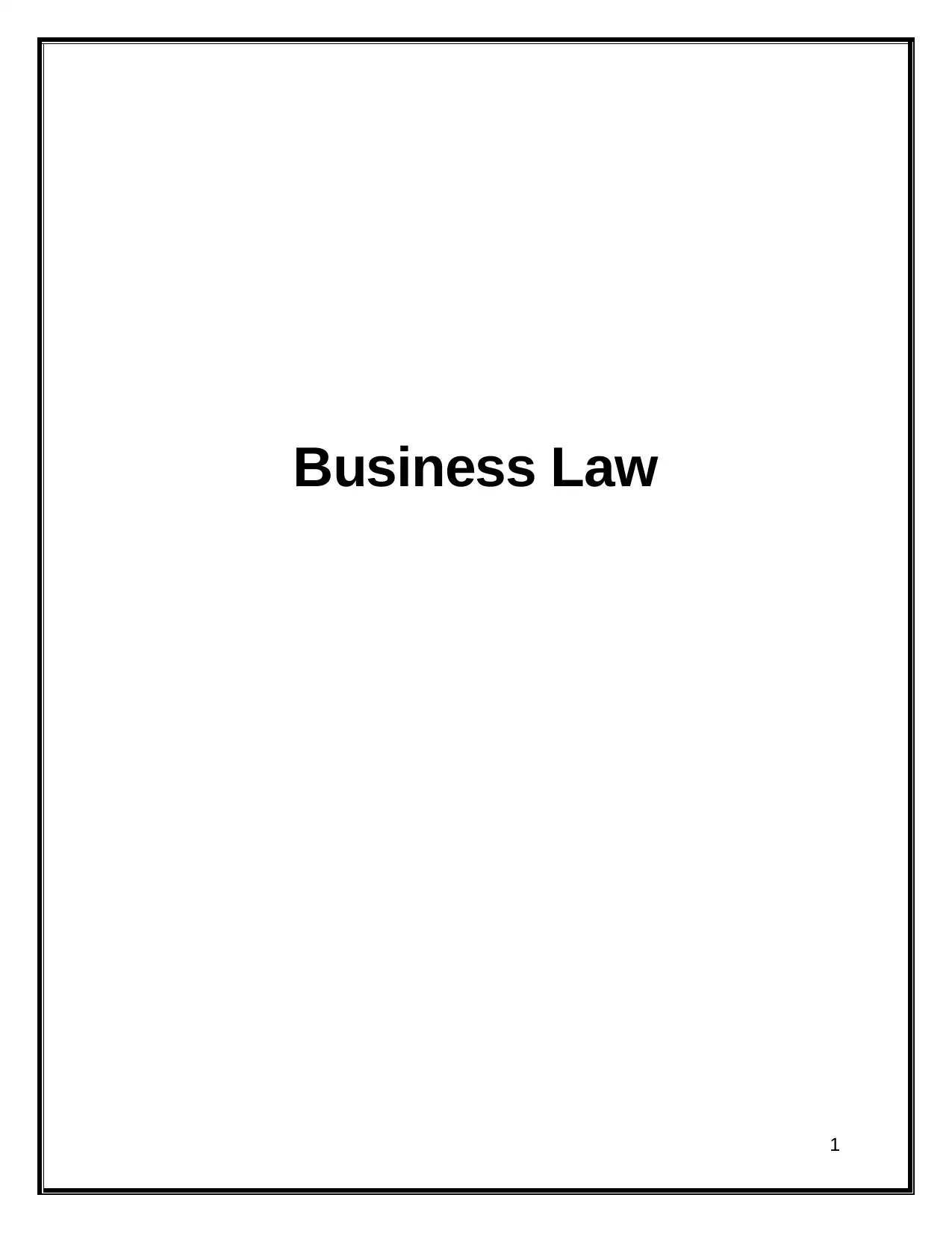
Business Law
1
1
Paraphrase This Document
Need a fresh take? Get an instant paraphrase of this document with our AI Paraphraser
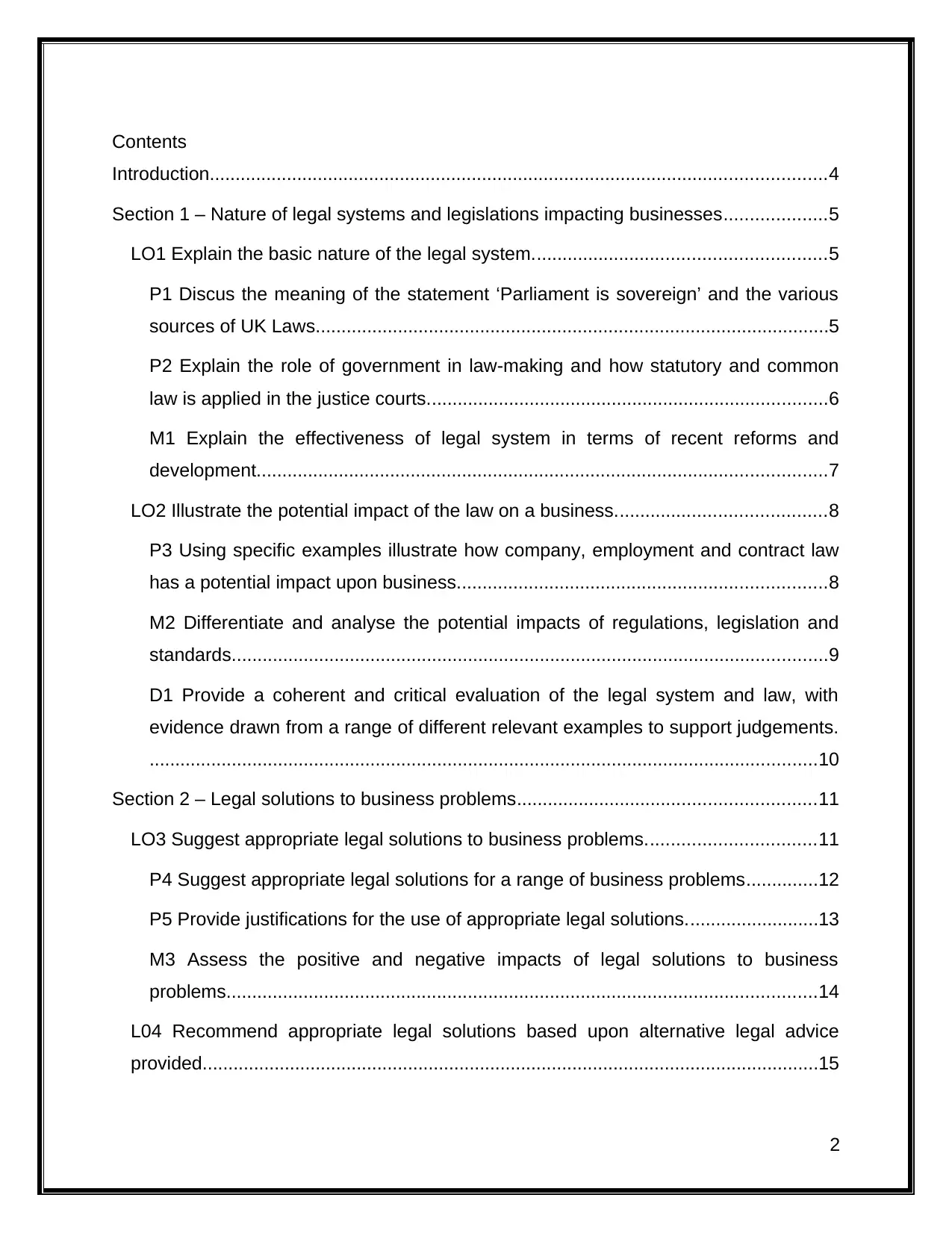
Contents
Introduction........................................................................................................................4
Section 1 – Nature of legal systems and legislations impacting businesses....................5
LO1 Explain the basic nature of the legal system.........................................................5
P1 Discus the meaning of the statement ‘Parliament is sovereign’ and the various
sources of UK Laws....................................................................................................5
P2 Explain the role of government in law-making and how statutory and common
law is applied in the justice courts..............................................................................6
M1 Explain the effectiveness of legal system in terms of recent reforms and
development...............................................................................................................7
LO2 Illustrate the potential impact of the law on a business.........................................8
P3 Using specific examples illustrate how company, employment and contract law
has a potential impact upon business........................................................................8
M2 Differentiate and analyse the potential impacts of regulations, legislation and
standards....................................................................................................................9
D1 Provide a coherent and critical evaluation of the legal system and law, with
evidence drawn from a range of different relevant examples to support judgements.
..................................................................................................................................10
Section 2 – Legal solutions to business problems..........................................................11
LO3 Suggest appropriate legal solutions to business problems.................................11
P4 Suggest appropriate legal solutions for a range of business problems..............12
P5 Provide justifications for the use of appropriate legal solutions..........................13
M3 Assess the positive and negative impacts of legal solutions to business
problems...................................................................................................................14
L04 Recommend appropriate legal solutions based upon alternative legal advice
provided........................................................................................................................15
2
Introduction........................................................................................................................4
Section 1 – Nature of legal systems and legislations impacting businesses....................5
LO1 Explain the basic nature of the legal system.........................................................5
P1 Discus the meaning of the statement ‘Parliament is sovereign’ and the various
sources of UK Laws....................................................................................................5
P2 Explain the role of government in law-making and how statutory and common
law is applied in the justice courts..............................................................................6
M1 Explain the effectiveness of legal system in terms of recent reforms and
development...............................................................................................................7
LO2 Illustrate the potential impact of the law on a business.........................................8
P3 Using specific examples illustrate how company, employment and contract law
has a potential impact upon business........................................................................8
M2 Differentiate and analyse the potential impacts of regulations, legislation and
standards....................................................................................................................9
D1 Provide a coherent and critical evaluation of the legal system and law, with
evidence drawn from a range of different relevant examples to support judgements.
..................................................................................................................................10
Section 2 – Legal solutions to business problems..........................................................11
LO3 Suggest appropriate legal solutions to business problems.................................11
P4 Suggest appropriate legal solutions for a range of business problems..............12
P5 Provide justifications for the use of appropriate legal solutions..........................13
M3 Assess the positive and negative impacts of legal solutions to business
problems...................................................................................................................14
L04 Recommend appropriate legal solutions based upon alternative legal advice
provided........................................................................................................................15
2
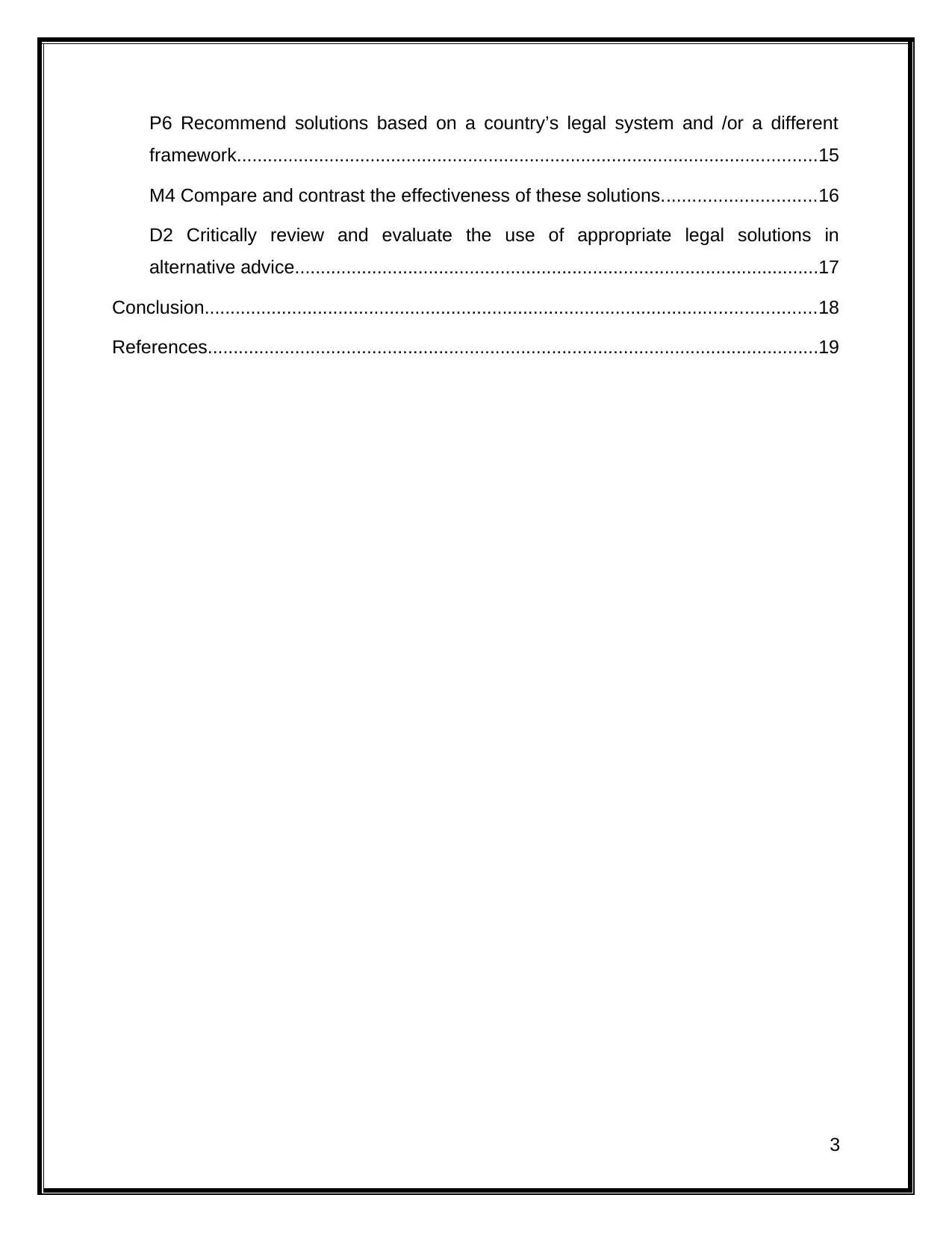
P6 Recommend solutions based on a country’s legal system and /or a different
framework.................................................................................................................15
M4 Compare and contrast the effectiveness of these solutions..............................16
D2 Critically review and evaluate the use of appropriate legal solutions in
alternative advice......................................................................................................17
Conclusion.......................................................................................................................18
References.......................................................................................................................19
3
framework.................................................................................................................15
M4 Compare and contrast the effectiveness of these solutions..............................16
D2 Critically review and evaluate the use of appropriate legal solutions in
alternative advice......................................................................................................17
Conclusion.......................................................................................................................18
References.......................................................................................................................19
3
⊘ This is a preview!⊘
Do you want full access?
Subscribe today to unlock all pages.

Trusted by 1+ million students worldwide
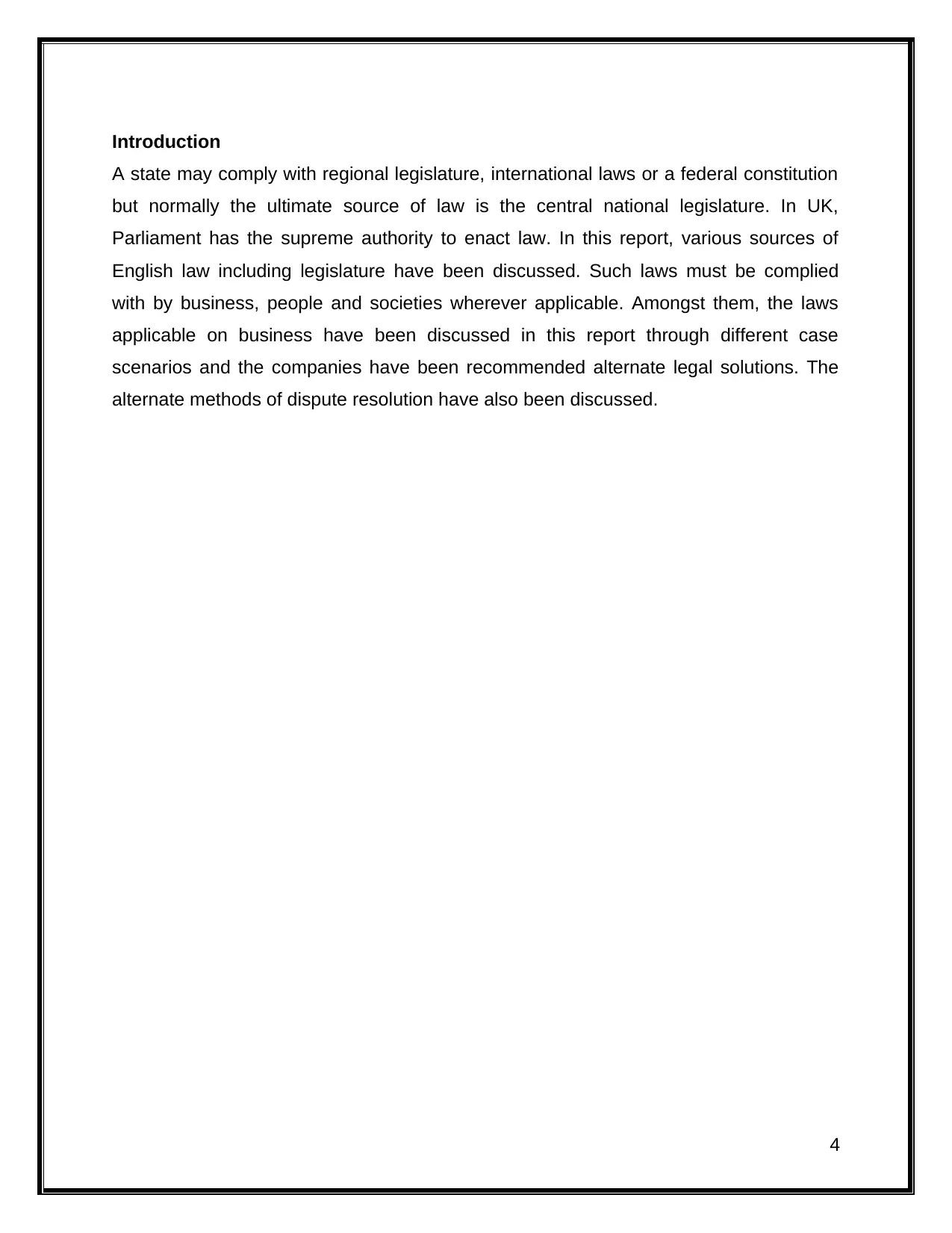
Introduction
A state may comply with regional legislature, international laws or a federal constitution
but normally the ultimate source of law is the central national legislature. In UK,
Parliament has the supreme authority to enact law. In this report, various sources of
English law including legislature have been discussed. Such laws must be complied
with by business, people and societies wherever applicable. Amongst them, the laws
applicable on business have been discussed in this report through different case
scenarios and the companies have been recommended alternate legal solutions. The
alternate methods of dispute resolution have also been discussed.
4
A state may comply with regional legislature, international laws or a federal constitution
but normally the ultimate source of law is the central national legislature. In UK,
Parliament has the supreme authority to enact law. In this report, various sources of
English law including legislature have been discussed. Such laws must be complied
with by business, people and societies wherever applicable. Amongst them, the laws
applicable on business have been discussed in this report through different case
scenarios and the companies have been recommended alternate legal solutions. The
alternate methods of dispute resolution have also been discussed.
4
Paraphrase This Document
Need a fresh take? Get an instant paraphrase of this document with our AI Paraphraser
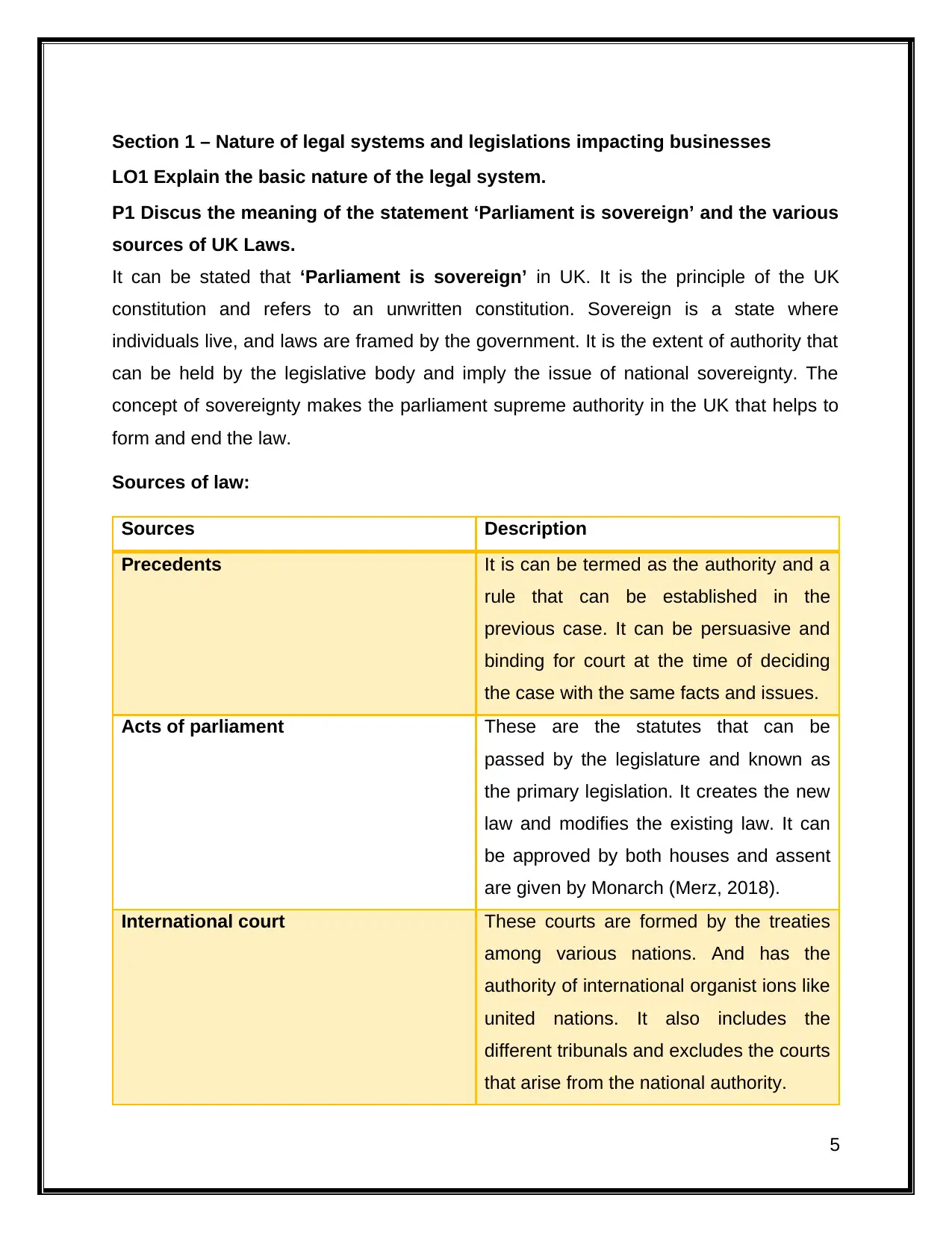
Section 1 – Nature of legal systems and legislations impacting businesses
LO1 Explain the basic nature of the legal system.
P1 Discus the meaning of the statement ‘Parliament is sovereign’ and the various
sources of UK Laws.
It can be stated that ‘Parliament is sovereign’ in UK. It is the principle of the UK
constitution and refers to an unwritten constitution. Sovereign is a state where
individuals live, and laws are framed by the government. It is the extent of authority that
can be held by the legislative body and imply the issue of national sovereignty. The
concept of sovereignty makes the parliament supreme authority in the UK that helps to
form and end the law.
Sources of law:
Sources Description
Precedents It is can be termed as the authority and a
rule that can be established in the
previous case. It can be persuasive and
binding for court at the time of deciding
the case with the same facts and issues.
Acts of parliament These are the statutes that can be
passed by the legislature and known as
the primary legislation. It creates the new
law and modifies the existing law. It can
be approved by both houses and assent
are given by Monarch (Merz, 2018).
International court These courts are formed by the treaties
among various nations. And has the
authority of international organist ions like
united nations. It also includes the
different tribunals and excludes the courts
that arise from the national authority.
5
LO1 Explain the basic nature of the legal system.
P1 Discus the meaning of the statement ‘Parliament is sovereign’ and the various
sources of UK Laws.
It can be stated that ‘Parliament is sovereign’ in UK. It is the principle of the UK
constitution and refers to an unwritten constitution. Sovereign is a state where
individuals live, and laws are framed by the government. It is the extent of authority that
can be held by the legislative body and imply the issue of national sovereignty. The
concept of sovereignty makes the parliament supreme authority in the UK that helps to
form and end the law.
Sources of law:
Sources Description
Precedents It is can be termed as the authority and a
rule that can be established in the
previous case. It can be persuasive and
binding for court at the time of deciding
the case with the same facts and issues.
Acts of parliament These are the statutes that can be
passed by the legislature and known as
the primary legislation. It creates the new
law and modifies the existing law. It can
be approved by both houses and assent
are given by Monarch (Merz, 2018).
International court These courts are formed by the treaties
among various nations. And has the
authority of international organist ions like
united nations. It also includes the
different tribunals and excludes the courts
that arise from the national authority.
5
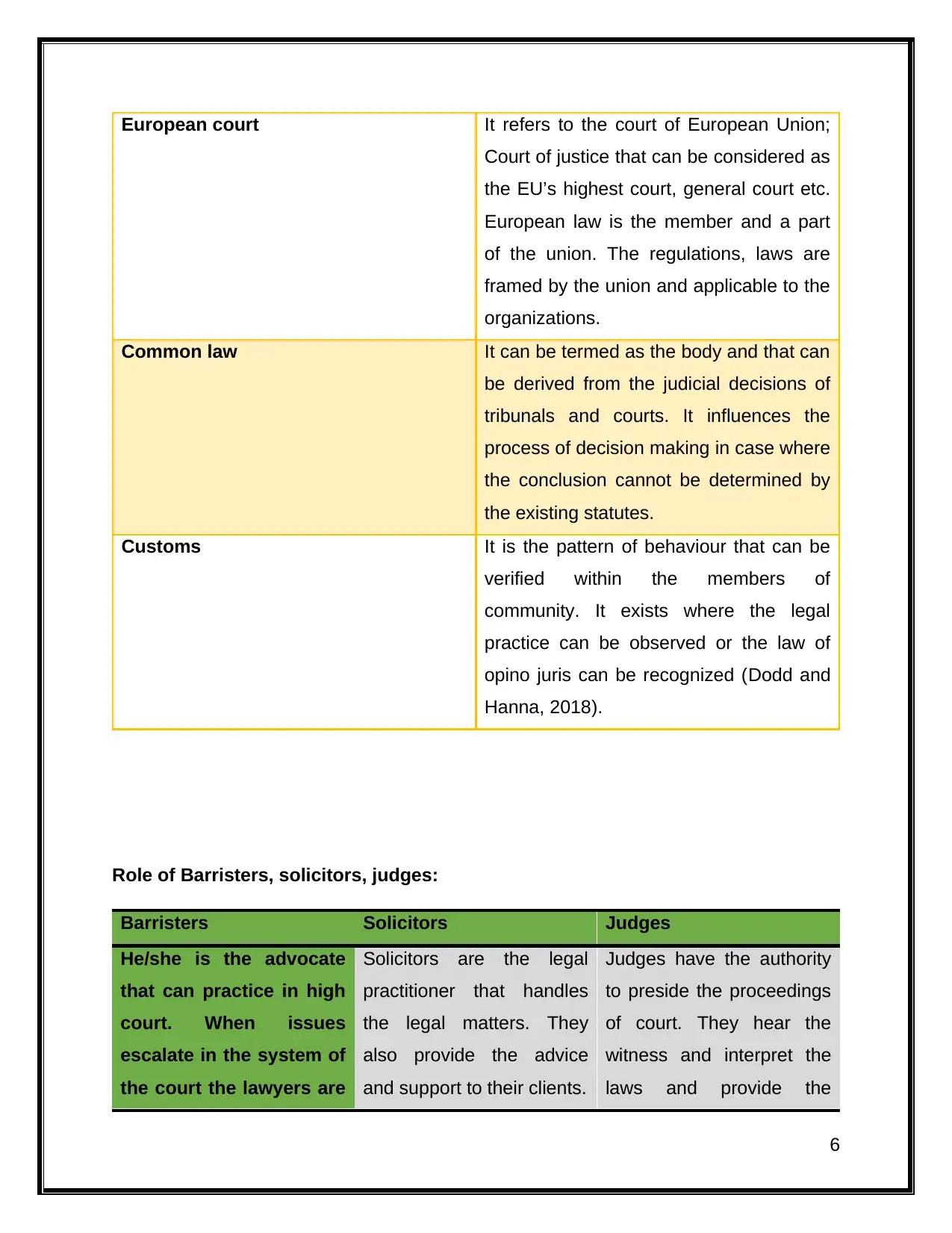
European court It refers to the court of European Union;
Court of justice that can be considered as
the EU’s highest court, general court etc.
European law is the member and a part
of the union. The regulations, laws are
framed by the union and applicable to the
organizations.
Common law It can be termed as the body and that can
be derived from the judicial decisions of
tribunals and courts. It influences the
process of decision making in case where
the conclusion cannot be determined by
the existing statutes.
Customs It is the pattern of behaviour that can be
verified within the members of
community. It exists where the legal
practice can be observed or the law of
opino juris can be recognized (Dodd and
Hanna, 2018).
Role of Barristers, solicitors, judges:
Barristers Solicitors Judges
He/she is the advocate
that can practice in high
court. When issues
escalate in the system of
the court the lawyers are
Solicitors are the legal
practitioner that handles
the legal matters. They
also provide the advice
and support to their clients.
Judges have the authority
to preside the proceedings
of court. They hear the
witness and interpret the
laws and provide the
6
Court of justice that can be considered as
the EU’s highest court, general court etc.
European law is the member and a part
of the union. The regulations, laws are
framed by the union and applicable to the
organizations.
Common law It can be termed as the body and that can
be derived from the judicial decisions of
tribunals and courts. It influences the
process of decision making in case where
the conclusion cannot be determined by
the existing statutes.
Customs It is the pattern of behaviour that can be
verified within the members of
community. It exists where the legal
practice can be observed or the law of
opino juris can be recognized (Dodd and
Hanna, 2018).
Role of Barristers, solicitors, judges:
Barristers Solicitors Judges
He/she is the advocate
that can practice in high
court. When issues
escalate in the system of
the court the lawyers are
Solicitors are the legal
practitioner that handles
the legal matters. They
also provide the advice
and support to their clients.
Judges have the authority
to preside the proceedings
of court. They hear the
witness and interpret the
laws and provide the
6
⊘ This is a preview!⊘
Do you want full access?
Subscribe today to unlock all pages.

Trusted by 1+ million students worldwide
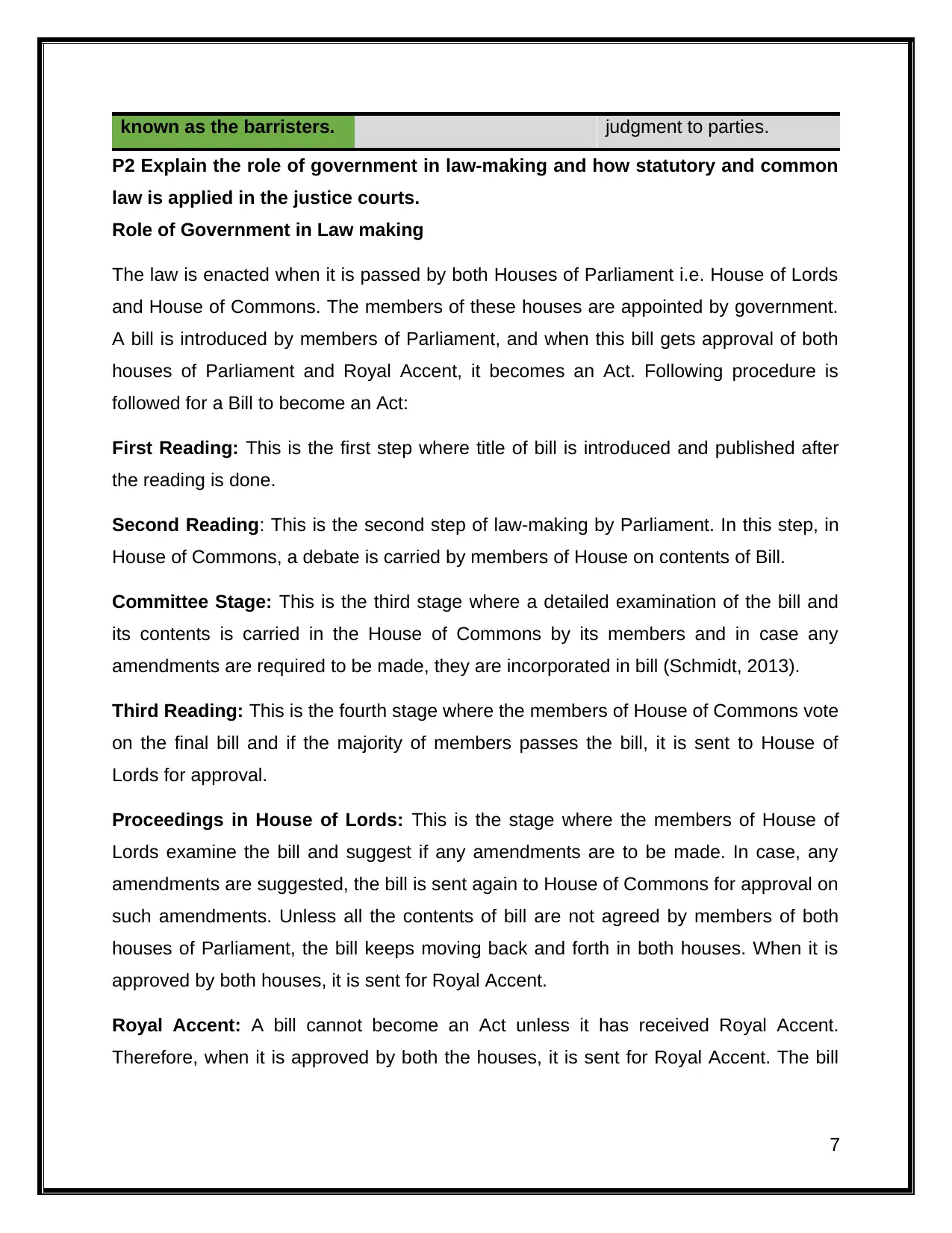
known as the barristers. judgment to parties.
P2 Explain the role of government in law-making and how statutory and common
law is applied in the justice courts.
Role of Government in Law making
The law is enacted when it is passed by both Houses of Parliament i.e. House of Lords
and House of Commons. The members of these houses are appointed by government.
A bill is introduced by members of Parliament, and when this bill gets approval of both
houses of Parliament and Royal Accent, it becomes an Act. Following procedure is
followed for a Bill to become an Act:
First Reading: This is the first step where title of bill is introduced and published after
the reading is done.
Second Reading: This is the second step of law-making by Parliament. In this step, in
House of Commons, a debate is carried by members of House on contents of Bill.
Committee Stage: This is the third stage where a detailed examination of the bill and
its contents is carried in the House of Commons by its members and in case any
amendments are required to be made, they are incorporated in bill (Schmidt, 2013).
Third Reading: This is the fourth stage where the members of House of Commons vote
on the final bill and if the majority of members passes the bill, it is sent to House of
Lords for approval.
Proceedings in House of Lords: This is the stage where the members of House of
Lords examine the bill and suggest if any amendments are to be made. In case, any
amendments are suggested, the bill is sent again to House of Commons for approval on
such amendments. Unless all the contents of bill are not agreed by members of both
houses of Parliament, the bill keeps moving back and forth in both houses. When it is
approved by both houses, it is sent for Royal Accent.
Royal Accent: A bill cannot become an Act unless it has received Royal Accent.
Therefore, when it is approved by both the houses, it is sent for Royal Accent. The bill
7
P2 Explain the role of government in law-making and how statutory and common
law is applied in the justice courts.
Role of Government in Law making
The law is enacted when it is passed by both Houses of Parliament i.e. House of Lords
and House of Commons. The members of these houses are appointed by government.
A bill is introduced by members of Parliament, and when this bill gets approval of both
houses of Parliament and Royal Accent, it becomes an Act. Following procedure is
followed for a Bill to become an Act:
First Reading: This is the first step where title of bill is introduced and published after
the reading is done.
Second Reading: This is the second step of law-making by Parliament. In this step, in
House of Commons, a debate is carried by members of House on contents of Bill.
Committee Stage: This is the third stage where a detailed examination of the bill and
its contents is carried in the House of Commons by its members and in case any
amendments are required to be made, they are incorporated in bill (Schmidt, 2013).
Third Reading: This is the fourth stage where the members of House of Commons vote
on the final bill and if the majority of members passes the bill, it is sent to House of
Lords for approval.
Proceedings in House of Lords: This is the stage where the members of House of
Lords examine the bill and suggest if any amendments are to be made. In case, any
amendments are suggested, the bill is sent again to House of Commons for approval on
such amendments. Unless all the contents of bill are not agreed by members of both
houses of Parliament, the bill keeps moving back and forth in both houses. When it is
approved by both houses, it is sent for Royal Accent.
Royal Accent: A bill cannot become an Act unless it has received Royal Accent.
Therefore, when it is approved by both the houses, it is sent for Royal Accent. The bill
7
Paraphrase This Document
Need a fresh take? Get an instant paraphrase of this document with our AI Paraphraser
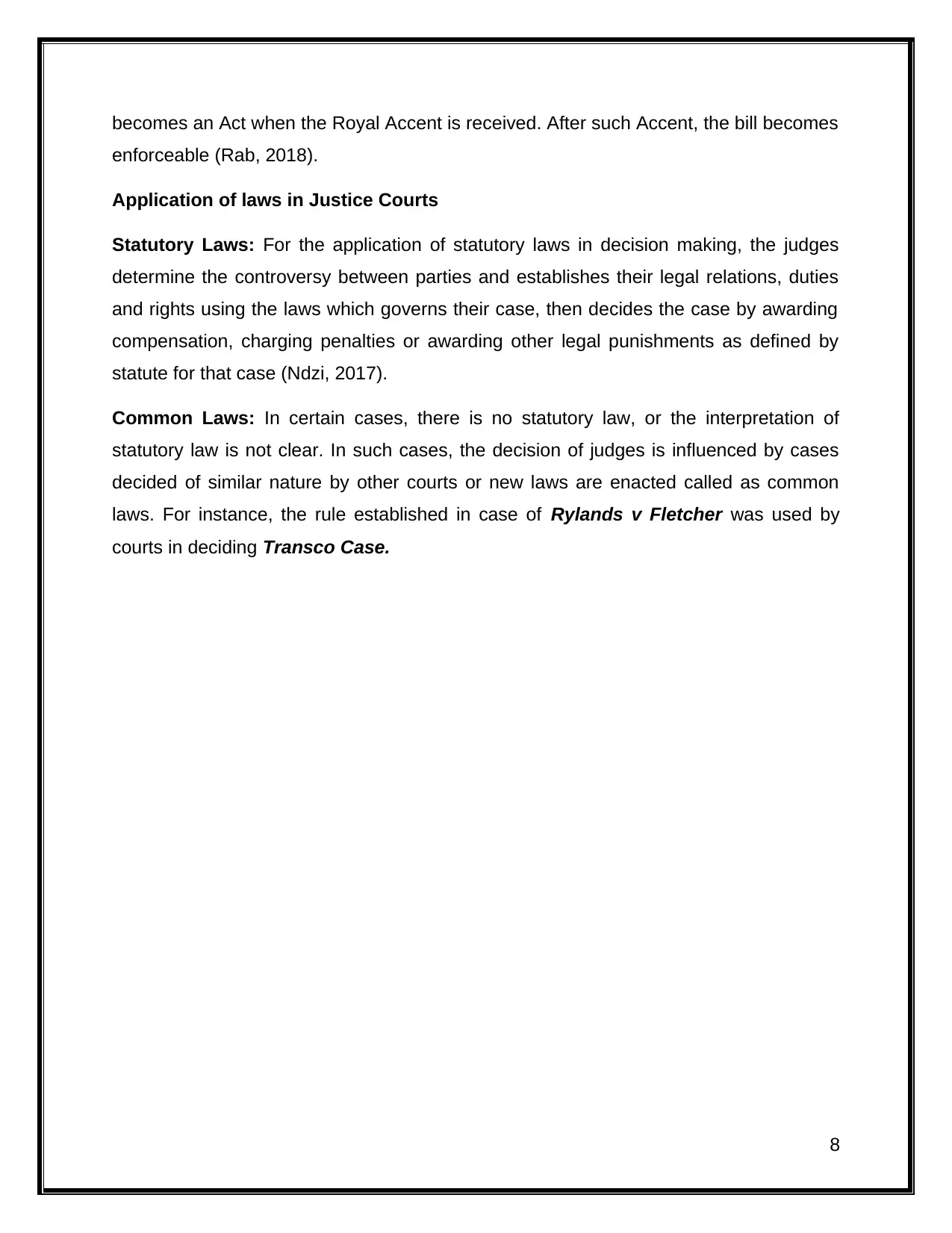
becomes an Act when the Royal Accent is received. After such Accent, the bill becomes
enforceable (Rab, 2018).
Application of laws in Justice Courts
Statutory Laws: For the application of statutory laws in decision making, the judges
determine the controversy between parties and establishes their legal relations, duties
and rights using the laws which governs their case, then decides the case by awarding
compensation, charging penalties or awarding other legal punishments as defined by
statute for that case (Ndzi, 2017).
Common Laws: In certain cases, there is no statutory law, or the interpretation of
statutory law is not clear. In such cases, the decision of judges is influenced by cases
decided of similar nature by other courts or new laws are enacted called as common
laws. For instance, the rule established in case of Rylands v Fletcher was used by
courts in deciding Transco Case.
8
enforceable (Rab, 2018).
Application of laws in Justice Courts
Statutory Laws: For the application of statutory laws in decision making, the judges
determine the controversy between parties and establishes their legal relations, duties
and rights using the laws which governs their case, then decides the case by awarding
compensation, charging penalties or awarding other legal punishments as defined by
statute for that case (Ndzi, 2017).
Common Laws: In certain cases, there is no statutory law, or the interpretation of
statutory law is not clear. In such cases, the decision of judges is influenced by cases
decided of similar nature by other courts or new laws are enacted called as common
laws. For instance, the rule established in case of Rylands v Fletcher was used by
courts in deciding Transco Case.
8
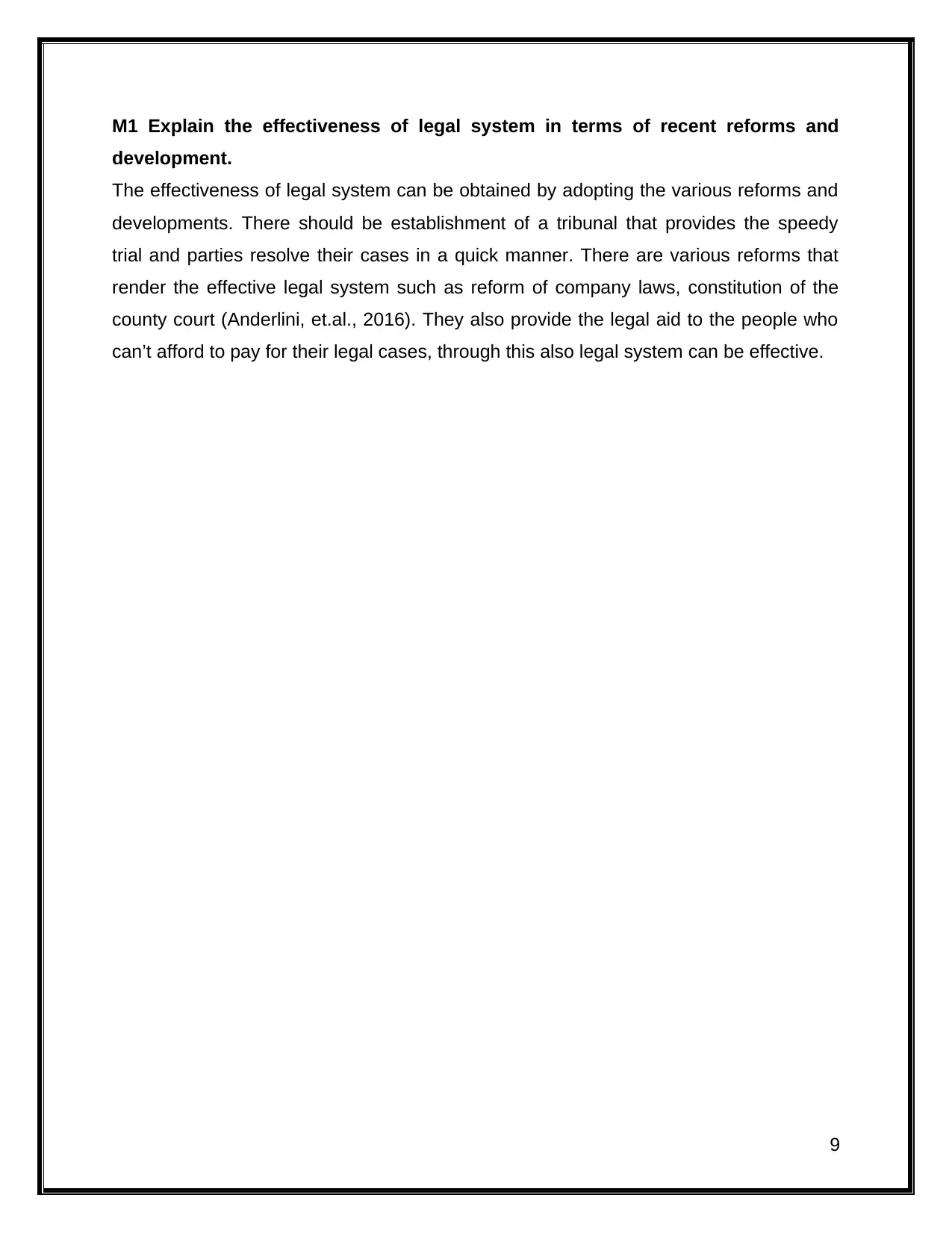
M1 Explain the effectiveness of legal system in terms of recent reforms and
development.
The effectiveness of legal system can be obtained by adopting the various reforms and
developments. There should be establishment of a tribunal that provides the speedy
trial and parties resolve their cases in a quick manner. There are various reforms that
render the effective legal system such as reform of company laws, constitution of the
county court (Anderlini, et.al., 2016). They also provide the legal aid to the people who
can’t afford to pay for their legal cases, through this also legal system can be effective.
9
development.
The effectiveness of legal system can be obtained by adopting the various reforms and
developments. There should be establishment of a tribunal that provides the speedy
trial and parties resolve their cases in a quick manner. There are various reforms that
render the effective legal system such as reform of company laws, constitution of the
county court (Anderlini, et.al., 2016). They also provide the legal aid to the people who
can’t afford to pay for their legal cases, through this also legal system can be effective.
9
⊘ This is a preview!⊘
Do you want full access?
Subscribe today to unlock all pages.

Trusted by 1+ million students worldwide
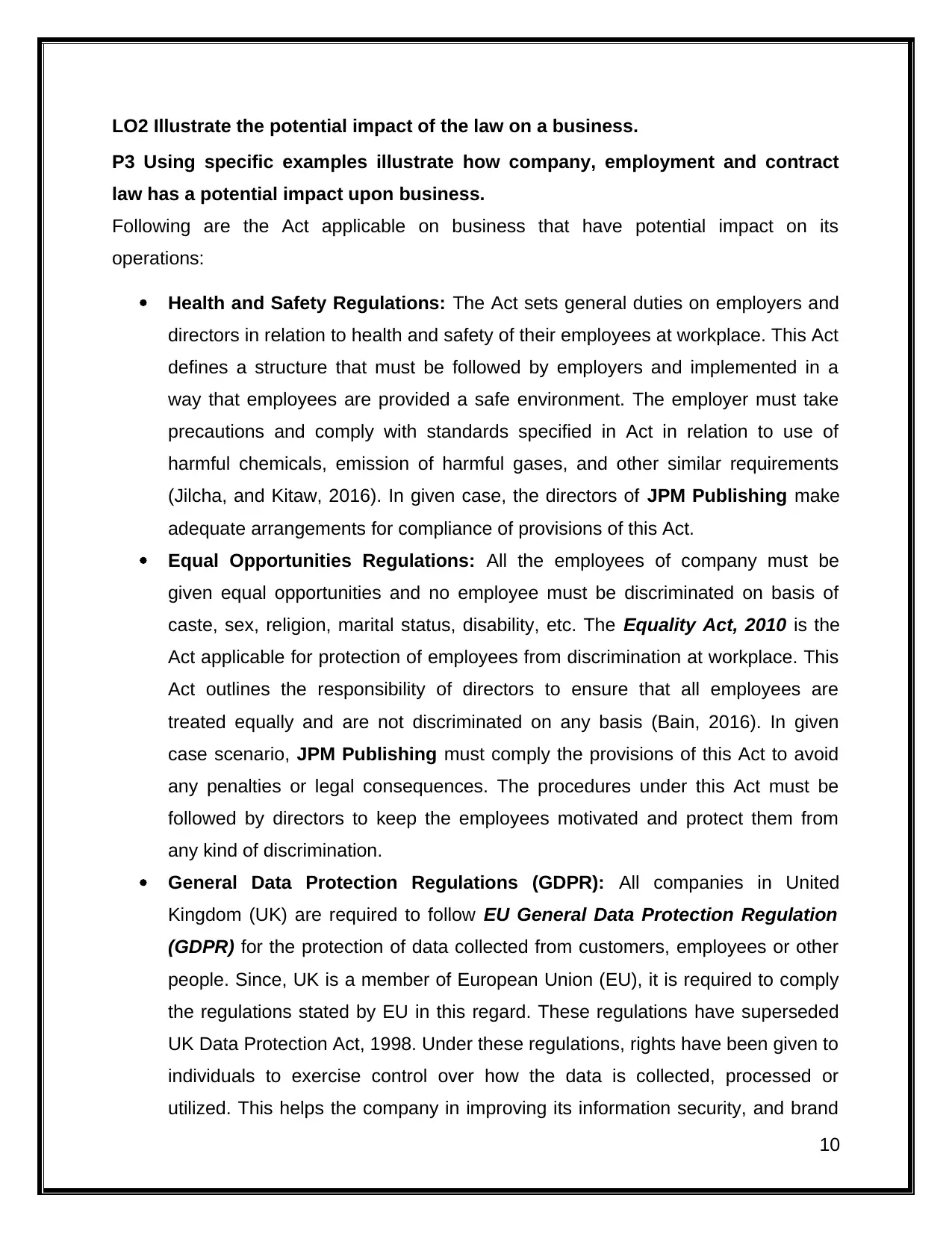
LO2 Illustrate the potential impact of the law on a business.
P3 Using specific examples illustrate how company, employment and contract
law has a potential impact upon business.
Following are the Act applicable on business that have potential impact on its
operations:
Health and Safety Regulations: The Act sets general duties on employers and
directors in relation to health and safety of their employees at workplace. This Act
defines a structure that must be followed by employers and implemented in a
way that employees are provided a safe environment. The employer must take
precautions and comply with standards specified in Act in relation to use of
harmful chemicals, emission of harmful gases, and other similar requirements
(Jilcha, and Kitaw, 2016). In given case, the directors of JPM Publishing make
adequate arrangements for compliance of provisions of this Act.
Equal Opportunities Regulations: All the employees of company must be
given equal opportunities and no employee must be discriminated on basis of
caste, sex, religion, marital status, disability, etc. The Equality Act, 2010 is the
Act applicable for protection of employees from discrimination at workplace. This
Act outlines the responsibility of directors to ensure that all employees are
treated equally and are not discriminated on any basis (Bain, 2016). In given
case scenario, JPM Publishing must comply the provisions of this Act to avoid
any penalties or legal consequences. The procedures under this Act must be
followed by directors to keep the employees motivated and protect them from
any kind of discrimination.
General Data Protection Regulations (GDPR): All companies in United
Kingdom (UK) are required to follow EU General Data Protection Regulation
(GDPR) for the protection of data collected from customers, employees or other
people. Since, UK is a member of European Union (EU), it is required to comply
the regulations stated by EU in this regard. These regulations have superseded
UK Data Protection Act, 1998. Under these regulations, rights have been given to
individuals to exercise control over how the data is collected, processed or
utilized. This helps the company in improving its information security, and brand
10
P3 Using specific examples illustrate how company, employment and contract
law has a potential impact upon business.
Following are the Act applicable on business that have potential impact on its
operations:
Health and Safety Regulations: The Act sets general duties on employers and
directors in relation to health and safety of their employees at workplace. This Act
defines a structure that must be followed by employers and implemented in a
way that employees are provided a safe environment. The employer must take
precautions and comply with standards specified in Act in relation to use of
harmful chemicals, emission of harmful gases, and other similar requirements
(Jilcha, and Kitaw, 2016). In given case, the directors of JPM Publishing make
adequate arrangements for compliance of provisions of this Act.
Equal Opportunities Regulations: All the employees of company must be
given equal opportunities and no employee must be discriminated on basis of
caste, sex, religion, marital status, disability, etc. The Equality Act, 2010 is the
Act applicable for protection of employees from discrimination at workplace. This
Act outlines the responsibility of directors to ensure that all employees are
treated equally and are not discriminated on any basis (Bain, 2016). In given
case scenario, JPM Publishing must comply the provisions of this Act to avoid
any penalties or legal consequences. The procedures under this Act must be
followed by directors to keep the employees motivated and protect them from
any kind of discrimination.
General Data Protection Regulations (GDPR): All companies in United
Kingdom (UK) are required to follow EU General Data Protection Regulation
(GDPR) for the protection of data collected from customers, employees or other
people. Since, UK is a member of European Union (EU), it is required to comply
the regulations stated by EU in this regard. These regulations have superseded
UK Data Protection Act, 1998. Under these regulations, rights have been given to
individuals to exercise control over how the data is collected, processed or
utilized. This helps the company in improving its information security, and brand
10
Paraphrase This Document
Need a fresh take? Get an instant paraphrase of this document with our AI Paraphraser
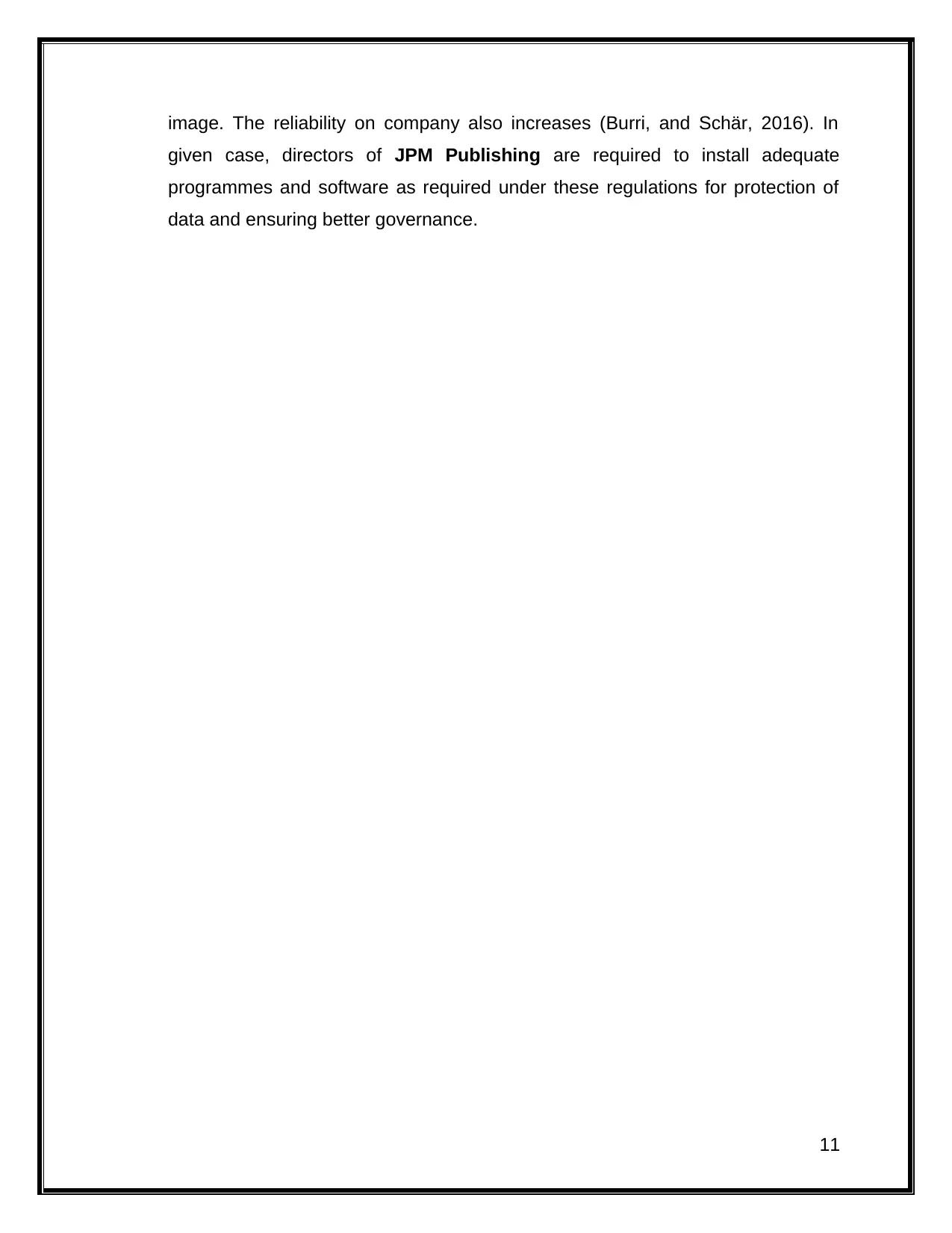
image. The reliability on company also increases (Burri, and Schär, 2016). In
given case, directors of JPM Publishing are required to install adequate
programmes and software as required under these regulations for protection of
data and ensuring better governance.
11
given case, directors of JPM Publishing are required to install adequate
programmes and software as required under these regulations for protection of
data and ensuring better governance.
11
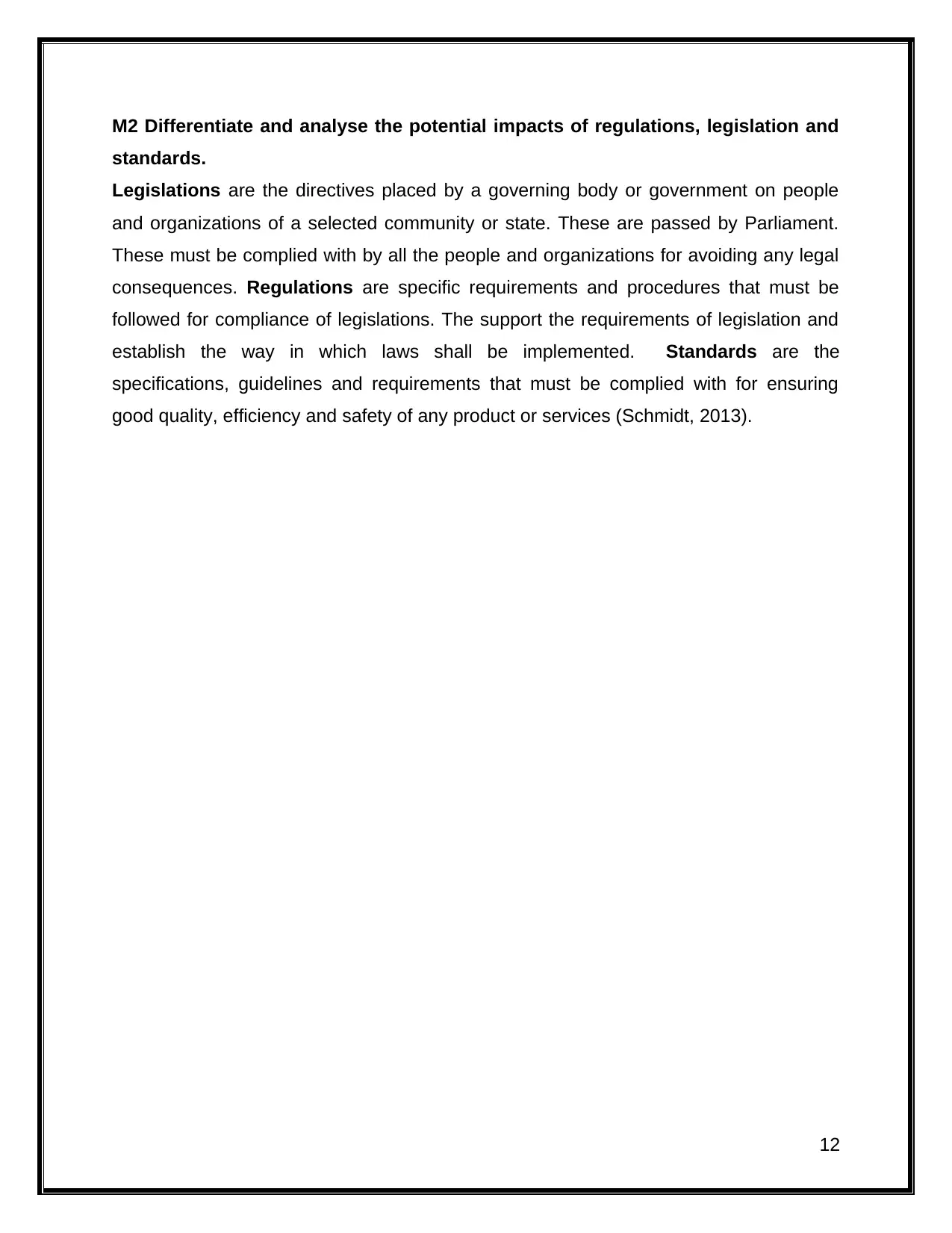
M2 Differentiate and analyse the potential impacts of regulations, legislation and
standards.
Legislations are the directives placed by a governing body or government on people
and organizations of a selected community or state. These are passed by Parliament.
These must be complied with by all the people and organizations for avoiding any legal
consequences. Regulations are specific requirements and procedures that must be
followed for compliance of legislations. The support the requirements of legislation and
establish the way in which laws shall be implemented. Standards are the
specifications, guidelines and requirements that must be complied with for ensuring
good quality, efficiency and safety of any product or services (Schmidt, 2013).
12
standards.
Legislations are the directives placed by a governing body or government on people
and organizations of a selected community or state. These are passed by Parliament.
These must be complied with by all the people and organizations for avoiding any legal
consequences. Regulations are specific requirements and procedures that must be
followed for compliance of legislations. The support the requirements of legislation and
establish the way in which laws shall be implemented. Standards are the
specifications, guidelines and requirements that must be complied with for ensuring
good quality, efficiency and safety of any product or services (Schmidt, 2013).
12
⊘ This is a preview!⊘
Do you want full access?
Subscribe today to unlock all pages.

Trusted by 1+ million students worldwide
1 out of 23
Related Documents
Your All-in-One AI-Powered Toolkit for Academic Success.
+13062052269
info@desklib.com
Available 24*7 on WhatsApp / Email
![[object Object]](/_next/static/media/star-bottom.7253800d.svg)
Unlock your academic potential
Copyright © 2020–2026 A2Z Services. All Rights Reserved. Developed and managed by ZUCOL.





